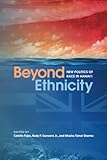Beyond Ethnicity : New Politics of Race in Hawai'i / ed. by Rudy P. Guevarra, Camilla Fojas, Nitasha Tamar Sharma.
Material type: TextPublisher: Honolulu : University of Hawaii Press, [2018]Copyright date: ©2018Description: 1 online resource (288 p.) : 1 b&w illustrationContent type:
TextPublisher: Honolulu : University of Hawaii Press, [2018]Copyright date: ©2018Description: 1 online resource (288 p.) : 1 b&w illustrationContent type: - 9780824869885
- 9780824873523
- 323.1969 23
- DU624.6
- online - DeGruyter
- Issued also in print.
| Item type | Current library | Call number | URL | Status | Notes | Barcode | |
|---|---|---|---|---|---|---|---|
 eBook
eBook
|
Biblioteca "Angelicum" Pont. Univ. S.Tommaso d'Aquino Nuvola online | online - DeGruyter (Browse shelf(Opens below)) | Online access | Not for loan (Accesso limitato) | Accesso per gli utenti autorizzati / Access for authorized users | (dgr)9780824873523 |
Frontmatter -- Contents -- Introduction: New Politics of Race in Hawai'i -- E Micronesia -- Chapter 1. Polynesia Is a Project, Not a Place: Polynesian Proximities to Whiteness in Cloud Atlas and Beyond -- Chapter 2. Mixed-Race Hollywood, Hawaiian Style -- Chapter 3. "I no eat dog, k" -- Chapter 4. "Eh! Where you from?" -- Chapter 5. Race and/or Ethnicity in Hawai'i -- Chapter 6. The Racial Imperative -- Chapter 7. Local Boy, East Coast Sensibilities -- Chapter 8. "Latino Threat in the 808?" -- Chapter 9. Local Haole? -- Chapter 10. Reconnecting Our Roots -- Afterword: Hawai'i Matters -- Contributors -- Index
restricted access online access with authorization star
http://purl.org/coar/access_right/c_16ec
Written by scholars of various disciplines, the essays in this volume dig beneath the veneer of Hawai'i's myth as a melting pot paradise to uncover historical and complicated cross-racial dynamics. Race is not the primary paradigm through which Hawai'i is understood. Instead, ethnic difference is celebrated as a sign of multicultural globalism that designates Hawai'i as the crossroads of the Pacific. Racial inequality is disruptive to the tourist image of the islands. It ruptures the image of tolerance, diversity, and happiness upon which tourism, business, and so many other vested transnational interests in the islands are based. The contributors of this interdisciplinary volume reconsider Hawai'i as a model of ethnic and multiracial harmony through the lens of race in their analysis of historical events, group relations and individual experiences, and humor, among other focal points. Beyond Ethnicity examines the dynamics between race, ethnicity, and indigeneity to challenge the primacy of ethnicity and cultural practices for examining difference in Hawai'i while recognizing the significant role of settler colonialism. This original and thought-provoking volume reveals what a racial analysis illuminates about the current political configuration of the islands and, in doing so, challenges how we conceptualize race on the continent.Recognizing the ways that Native Hawaiians or Kānaka Maoli are impacted by shifting, violent, and hierarchical colonial structures that include racial inequalities, the editors and contributors explore questions of personhood and citizenship through language, land, labor, and embodiment. By admitting to these tensions and ambivalences, the editors set the pace and tempo of powerfully argued essays that engage with the various ways that Kānaka Maoli and the influx of differentially racialized settlers continue to shift the social, political, and cultural terrains of the Hawaiian Islands over time.
Issued also in print.
Mode of access: Internet via World Wide Web.
In English.
Description based on online resource; title from PDF title page (publisher's Web site, viewed 02. Mrz 2022)


